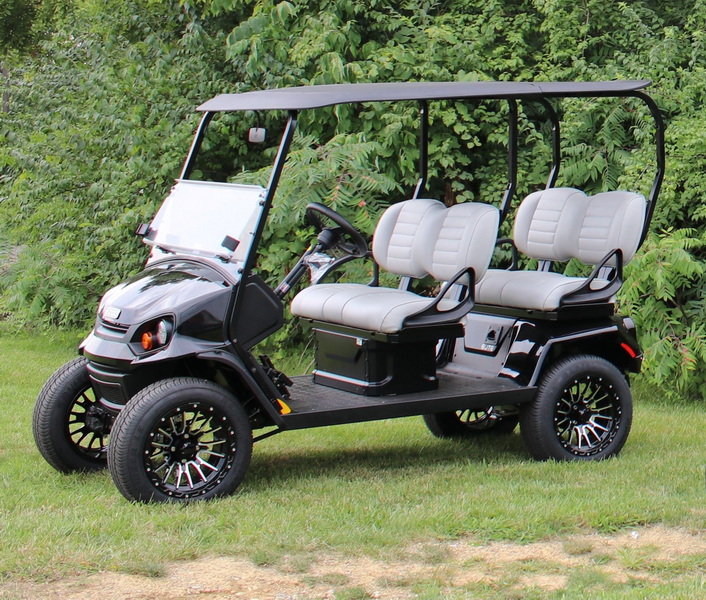Content Menu
● Understanding Golf Cart Types
● Performance Comparison
>> Gas Golf Carts
>> Electric Golf Carts
● Maintenance Needs
>> Gas Golf Carts
>> Electric Golf Carts
● Cost Considerations
>> Initial Purchase Price
>> Operating Costs
● Environmental Impact
>> Gas Golf Carts
>> Electric Golf Carts
● Reliability
● User Experience
>> Gas Golf Carts
>> Electric Golf Carts
● Conclusion
● FAQs
>> 1. What is the average lifespan of gas vs electric golf carts?
>> 2. How do maintenance costs compare between gas and electric golf carts?
>> 3. Can I use an electric golf cart in areas without charging stations?
>> 4. Are gas golf carts more powerful than electric ones?
>> 5. Which type of golf cart is better for the environment?
When it comes to choosing a golf cart, one of the most frequently debated topics is whether to opt for a gas-powered or electric model. Both types of golf carts have their advantages and disadvantages, and the choice can significantly affect your golfing experience, maintenance costs, and environmental impact. This article aims to provide a comprehensive comparison between gas and electric golf carts, focusing on reliability, performance, maintenance, cost, and environmental considerations.

Understanding Golf Cart Types
Golf carts are typically classified into two main categories based on their power source:
- Gas Golf Carts: These carts operate on internal combustion engines, similar to those found in cars. They use gasoline as fuel and are known for their power and range.
- Electric Golf Carts: These utilize rechargeable batteries as their power source. They are generally quieter and produce zero emissions during operation.
Performance Comparison
Gas Golf Carts
Gas-powered golf carts are renowned for their robust performance. Here are some key features:
- Power and Speed: Gas carts can achieve higher speeds than electric models, making them suitable for hilly terrains and longer distances. They can typically travel 120 miles or more on a single tank of gas.
- Consistent Power Delivery: Unlike electric carts, which may lose power as the battery depletes, gas carts maintain consistent performance throughout their fuel range.
- Quick Refueling: Refueling a gas cart takes only a few minutes at a gas station, allowing for minimal downtime between uses.
- Handling Heavy Loads: Gas carts excel in towing capacity and can handle heavier loads without compromising performance. This makes them ideal for transporting equipment or passengers over rough terrain.
Electric Golf Carts
Electric golf carts have made significant advancements in recent years. Their performance characteristics include:
- Smooth Acceleration: Electric motors provide instant torque, resulting in smooth acceleration and deceleration.
- Quiet Operation: The absence of a combustion engine means electric carts operate quietly, enhancing the golfing experience without noise pollution.
- Range Limitations: Most electric carts can travel between 30 to 50 miles on a single charge, which may require recharging during extended outings. However, newer models with advanced battery technology can achieve ranges of up to 100 miles.
- Advanced Features: Many modern electric carts come equipped with features such as regenerative braking systems that help recharge the batteries while driving downhill or slowing down.

Maintenance Needs
Gas Golf Carts
Gas-powered models require more regular maintenance due to their mechanical complexity:
- Routine Maintenance: Owners must perform oil changes, filter replacements, and engine tune-ups regularly. Neglecting these tasks can lead to costly repairs.
- Higher Maintenance Costs: The cumulative cost of maintaining a gas engine can be significant over time due to the need for various mechanical parts and fluids.
- Winterization Needs: Gas carts often require winterization procedures if stored during colder months, including fuel stabilizers to prevent engine issues when starting up after a long period of inactivity.
Electric Golf Carts
Electric golf carts are generally easier to maintain:
- Lower Maintenance Requirements: They have fewer moving parts and do not require oil changes. Regular checks on battery water levels and terminal cleanliness are usually sufficient.
- Battery Replacement Costs: While electric carts have lower ongoing maintenance costs, they do require battery replacements every 5-7 years, which can be expensive (ranging from $750 to $900).
- Charging Infrastructure: Ensuring access to charging stations is crucial for electric cart owners. This can be a consideration if you plan to use the cart in areas where charging options are limited.
Cost Considerations
Initial Purchase Price
- Gas golf carts often have a lower initial purchase price compared to electric models. However, this advantage can be offset by higher long-term operating costs associated with fuel and maintenance.
Operating Costs
- Electric golf carts typically incur lower operating costs due to cheaper electricity rates compared to gasoline prices. Charging an electric golf cart battery costs just a fraction of refueling a gas cart; electricity prices average 10-15 cents per kWh, while gas averages $3-$4 per gallon[1].
- Over time, the total cost of ownership for electric carts tends to be lower when factoring in fuel savings and reduced maintenance needs.
Environmental Impact
Gas Golf Carts
Gas-powered golf carts emit exhaust gases that contribute to air pollution. Although newer models are designed to be more fuel-efficient and environmentally friendly than older versions, they still produce carbon emissions. Multiple studies have shown that gas-powered golf carts emit almost the same amount of pollution as cars driving the same distance[5].
Electric Golf Carts
Electric golf carts are considered the greener option as they produce zero emissions during operation. They can also be charged using renewable energy sources, further reducing their environmental footprint[13].

Reliability
When considering reliability:
- Gas Golf Carts: With proper maintenance, gas-powered models can last many years but may require more frequent repairs due to their complex mechanical systems.
- Electric Golf Carts: Newer electric models tend to be highly reliable due to fewer moving parts. They often have longer lifespans if battery maintenance is managed properly[19].
User Experience
The user experience varies significantly between gas and electric golf carts:
Gas Golf Carts
- Users often appreciate the immediate power delivery of gas engines, especially when navigating steep hills or rough terrains.
- However, some users report that gas engines can be noisy and produce vibrations that detract from the overall experience[2].
Electric Golf Carts
- Electric models provide a smoother ride with less noise pollution. Many golfers prefer the serene environment that electric carts offer while playing[6].
- The lack of emissions enhances the enjoyment of being outdoors without contributing to air pollution or disturbing wildlife[28].
Conclusion
In summary, the choice between gas and electric golf carts largely depends on individual needs and preferences:
- If you prioritize speed, power for hilly terrains, or quick refueling capabilities, a gas golf cart may be the better option for you.
- If you seek lower operating costs, quieter operation, and an environmentally friendly choice, an electric golf cart could be more suitable.
Ultimately, both options offer unique advantages that cater to different user requirements. It's essential to evaluate your specific needs—such as how often you'll use the cart, the terrain you'll navigate, and your budget—to make an informed decision.

FAQs
1. What is the average lifespan of gas vs electric golf carts?
The average lifespan of both types of golf carts ranges from 10 to 20 years with proper maintenance. Electric models may require battery replacements every 5-7 years.
2. How do maintenance costs compare between gas and electric golf carts?
Gas golf carts typically incur higher maintenance costs due to oil changes and engine upkeep; electric carts generally have lower ongoing expenses but may require costly battery replacements every few years.
3. Can I use an electric golf cart in areas without charging stations?
Yes, but it's essential to ensure that you have access to charging facilities if you plan on using it frequently in such areas; otherwise, range limitations may hinder usage.
4. Are gas golf carts more powerful than electric ones?
Generally yes; gas-powered models tend to have higher top speeds and better performance on steep inclines compared to most electric models.
5. Which type of golf cart is better for the environment?
Electric golf carts are better for the environment as they produce zero emissions during operation while gas-powered models emit exhaust gases contributing to pollution.











































